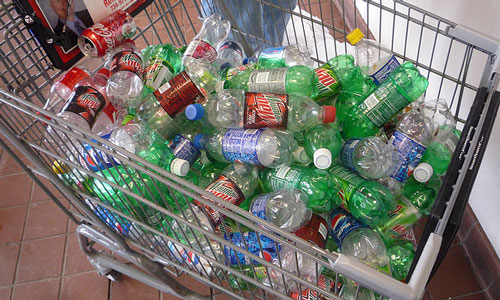Bottles and Cans and Just Clap Your Hands
About ten states have bottle deposit laws—measures designed to get you to bring your bottles back for recycling. Why aren't they more common?
“Litter drove him wild. He’d come back with these bags and wave them and say, ‘Why do people have to do this?’ It perplexed him to no end. Knowing my father, he might have been worrying about how to solve the litter problem for ten years and never said anything about it.”
— Victoria Berger, the daughter of concerned citizen Richard Chambers, the man who successfully advocated for the bottle deposit rule in Oregon. Chambers, a nature advocate frustrated by the damage that litter was causing to the beaches and nature areas he loved, reached out to his state legislator, Rep. Paul Hanneman, in an effort to deal with the issue. He called Hanneman, inspired by a bottle-deposit plan being hatched in British Columbia, and convinced him to introduce legislation of his own. “Look at this mess,” Chambers told Hanneman. “We can stop this.”

(Jason Argo/Flickr)
Bottle litter: How manufacturers let the problem get so bad
The crazy part about Oregon’s move, which was quickly replicated in nine other states, is that a few decades prior, the soda industry had previously done deposits on their own—only to eventually decide it wasn’t worth it.
The reason for that shift had much to do with the evolution of how we drink beverages. Prior to World War II, much of our soda came bottled in refillable glass bottles that were expensive to produce, so the industry had a clear reason for wanting those bottles back.
But eventually, technology improved and different types of containers became more common: first, new types of glass bottles that weren’t made to be refillable, and later aluminum cans, which quickly overtook the market from glass bottles.
These new kinds of containers were easier and cheaper to manufacture, but they also encouraged the public to not necessarily show the environment the respect it deserved. Quickly, littering of bottles and cans became a major nuisance.
To the industry’s credit, they’ve started to move away from this poor attitude on the issue, embracing recycling as important from both a business standpoint—as it turns out, aluminum is super-recyclable—and a corporate responsibility standpoint.
One thing that might help matters even further on this front is the rise of craft brewers, who may have a stronger focus on environmental issues than their big-box peers. In Montana, for example, craft brewers are helping by taking advantage of the state’s glut of old glass bottles.
“They really deserve an award for this program,” Dusti Johnson, an official with the Montana Department of Environmental Quality, told Yes! Magazine. “They’re saying, ‘hey, bring your waste back’ and then they’re using it again, which is even better than recycling.”
$13M

(Rex Roof/Flickr)
So why don’t more states have bottle deposit laws?
Simply put, bottle deposits tend to be more popular with the public than they are with manufacturers and retailers, who see the problem as economically damaging to their primary interest—selling beverages.
As a result, industry lobbying groups have increased their fight against the laws in recent years, arguing that curbside recycling is a better way to solve the problem.
“Comprehensive recycling programs, like curbside collection, provide an easy and effective way for consumers to recycle their household waste, including beverage bottles and cans,” the American Beverage Association states on its website. “Yet, some argue that these convenient and effective voluntary programs don’t go far enough. Data shows these deposit programs are costly, inconvenient and compete with more successful voluntary recycling efforts.”
That hasn’t stopped advocates of such laws from trying to expand them to other states, however. Texas, for example, has tried multiple times to introduce such a law, as recently as this year.
But bottle-deposit programs could eventually gain some ground in the years to come, as curbside collection efforts around glass in particular start to become more problematic.
Whether bottle deposits gain ground or not, one thing is clear, according to a 2013 study by the Container Recycling Institute: Despite an increase in beverage sales in recent years, recycling levels have remained fairly stagnant.
“You can make as much as you want if you put in the legwork.”
— Francis, a California can collector, discussing the nature of his work with Priceonomics. The state’s can-collection policy—5 cents for small bottles, 15 cents for large ones—has been a bit of a boon for those looking for a source of income, though the website notes that the back-breaking nature of the work often makes the rewards less valuable in the long run.
One of my first jobs involved working at a grocery store in Michigan. I was the guy who ran the bottle machine, mostly. We had the big, automated recycling machines for aluminum and plastic, though we had to put glass bottles into boxes after they came in on a conveyor belt.
The machines didn’t work particularly well; craft beers and obscure soda brands would gum up the machines, and frequently, people would come in with bottles in the hundreds, if not thousands—something the machines were poorly designed handle.
On a purely ecological and political level, bottle deposits are simply a great idea. But standing in the shoes of my teenage self, after a day covered in sweat and soda residue from dealing with the bottle-recycling machine, I would have done anything to convince the public that curbside recycling was the answer.
If you have $100 in bottles to deposit, I am not your friend.
:format(jpeg)/2018/04/seicbkbnkmx49h60idce.gif)
/2018/04/seicbkbnkmx49h60idce.gif)

/uploads/ernie_crop.jpg)